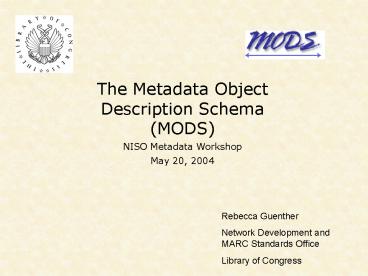What is METS - PowerPoint PPT Presentation
Title:
What is METS
Description:
Descriptive metadata standard (not for document markup) Initiative of Network Development and MARC Standards ... Elements generally inherit semantics of MARC ... – PowerPoint PPT presentation
Number of Views:34
Avg rating:3.0/5.0
Title: What is METS
1
The Metadata Object Description Schema
(MODS) NISO Metadata Workshop May 20, 2004
Rebecca Guenther Network Development and MARC
Standards Office Library of Congress
2
What is MODS?
- Metadata Object Description Schema
- Descriptive metadata standard (not for document
markup) - Initiative of Network Development and MARC
Standards Office at LC - Uses XML Schema
- Originally designed for library applications, but
may be used for others - A derivative of MARC
3
Why MODS?
- XML (Extensible Markup Language) is the markup
for the Web - Investigating XML as a new more flexible syntax
for MARC element set - Need for rich descriptive metadata in XML but
simpler than full MARC, especially for complex
digital library objects
4
Potential Uses of MODS
- As a rich (but not too rich) XML metadata format
for emerging initiatives - Z39.50 Next Generation specified format
- extension schema to METS
- to represent metadata for harvesting (OAI)
- As an interoperable core for convergence between
MARC and non-MARC XML descriptions - For original resource description in XML syntax
using language based tags
5
Advantages of MODS
- Element set is richer than Dublin Core
- Hierarchy allows for rich description, especially
of complex digital objects - Element set is compatible with existing
descriptions in large library databases - Rich description that works well with
hierarchical METS objects
6
Features of MODS
- Uses language-based tags
- Elements generally inherit semantics of MARC
- Elements particularly applicable to digital
resources - MODS does not assume the use of any specific
rules for description - Element descriptions are reused throughout the
schema - Use of XML schema allows for flexibility and
availability of freely available tools
7
MODS high-level elements
- Title Info
- Name
- Type of resource
- Genre
- Origin Info
- Language
- Physical description
- Abstract
- Table of contents
- Target audience
- Note
- Subject
- Classification
- Related item
- Identifier
- Location
- Access conditions
- Extension
- Record Info
8
Status of MODS
- Open listserv collaboration of self-selected
possible implementors, LC coordinated (1st half
2002) - First comment and use period June December
2002 - Version 2.0 Feb. 2003-Dec. 2003
- MODS version 3.0 now available
- Version 3.0 includes corrections and citation
information for journal article - Registration submitted to NISO, now being
balloted - Coming a MODS for authorities called MADS
9
LC uses of MODS
- Describing electronic resources
- AV project, web archiving
- Incorporation with XML resources
- METS projects for digital resources (e.g. IHAS,
Blackmun) - OAI collections
- LC offers MODS, MARCXML, DC simple
- Further use planned for lightweight descriptions
for Web resources
10
MINERVA at LC
- MINERVA LCs web archiving project (based on
specific themes) - Exploring issues with born digital resources
- MODS used for descriptive metadata
- Election 2002 Web archive
- Collaboration with Internet Archive,
Webarchivist.org - Selective collection of archived sites July-Nov.
2002 - MODS records for each site
- Other collections 9/11, 107th Congress
- Plan to use METS and develop profile for Web
sites for 107th - Metadata done in-house, more controlled
11
Fields used in Minerva project
- Title
- Name (structured form)
- Abstract
- Date captured
- Genre (value always Web site)
- Physical description (file formats)
- Identifier (base URL)
- Language
- Access conditions/rights management
- Subject (keyword or LCSH if possible)
12
Sample MODS record for Election 2002
- Fran Ulmer web site record (XML)
13
(No Transcript)
14
(No Transcript)
15
MODS projects
- AV Prototype Project (Library of Congress)
- Digital preservation for audio and video
- Uses METS and MODS with focus on metadata
- University of California press
- Using METS with MODS for freely available ebooks
- California Digital Library
- Digitization of archival materials
- Other METS projects as descMD section
- MusicAustralia
- MODS as exchange format between National Library
of Australia and ScreenSoundAustralia
16
Bibliographic citations
- Additions to MODS 3.0 to allow for output of
bibliographic citations - Parsed elements to generate OpenURL
- Stylesheet to output citation in particular
citation format - ltpartgt
- ltdetailgt
- ltextentgt
- ltdategt
- lttextgt
17
Differences between MODS and Dublin Core
- MODS has structure
- Names
- Publication information (originInfo)
- Related item
- Subject
- MODS is more compatible with library data
- Semantics
- Conversions
- Relationships between elements
- Includes record management (administrative
metadata) information
18
Choosing MODS for descriptive metadata
- MODS is particularly useful for
- compatibility with existing bibliographic data
- embedded descriptions in relatedItem
- Rich, hierarchical descriptions that work well
with METS structural map - out of the box schema can use ltextensiongt for
local elements and to bring in external elements
from other schemas
19
Conclusions
- MODS was developed as a rich descriptive metadata
standard that works well with other XML
standards/initiatives - Provides a descriptive metadata standard
intermediate in richness between Dublin Core and
MARC 21 (or other specialized descriptive
metadata standard) - Although a derivative of MARC, MODS has wide
potential application as a rich descriptive
metadata standard for various needs - XML tools allow for easy transformations (made
available by LC)
20
For further information
http//www.loc.gov/standards/mods































